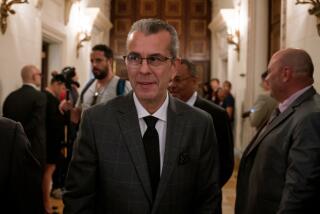Battle goes on after Ukraine election
- Share via
KIEV, UKRAINE — Warning that falsification of parliamentary election results would be punished, President Viktor Yushchenko on Monday ordered a criminal inquiry into delayed vote counting in regions that are strongholds of his longtime rival, Prime Minister Viktor Yanukovich.
The prime minister, for his part, accused parties associated with the president of prematurely claiming victory based on exit polls rather than waiting for the ballots cast in Sunday’s election to be counted.
The political struggle here is between the same two camps that faced off in Ukraine’s 2004 presidential race between pro-Western Yushchenko and Moscow-backed Yanukovich. At that time, weeks of street protests against electoral fraud, dubbed the Orange Revolution, triggered a repeat vote that shifted victory from Yanukovich to Yushchenko.
Victory in the parliamentary race still seemed to hang in the balance Monday. But trends appeared to give an edge to the Orange camp, named after Yushchenko’s campaign color, which has indicated it would give the prime minister’s post to Yulia Tymoshenko, a fiery leader of the 2004 protests.
With 90% of the vote counted as of late Monday evening, Yanukovich’s Party of Regions led with 33%. Tymoshenko’s bloc was in second place with 31%. The Our Ukraine-People’s Self-Defense bloc, which is closely associated with Yushchenko and allied with Tymoshenko, was third with 15%. The Communists, allied with Yanukovich, had 5%. The Volodymyr Lytvyn bloc, with 4%, could potentially join a coalition with either camp.
Exit polls had predicted that only these five parties would pass a 3% hurdle to win seats in parliament. But in the latest results, the Socialist Party had almost exactly 3%.
Suspicions of vote rigging focused on the possibility that backers of Yanukovich, working at local and regional election commissions, might be trying to boost the Socialists’ tally enough for the party to win seats. The Socialists were part of the Orange coalition in 2004, but switched sides last year, enabling Yanukovich to become prime minister.
Fanning suspicions, Ukrainian television reported that in the eastern city of Mariupol, considered a Party of Regions stronghold, the Socialists had finished in first place according to official results.
“Delays with vote counting in eastern and southern Ukrainian regions . . . are making me anxious,” Yushchenko said Monday. “I demand explanations from the Central Election Commission and the prosecutor general’s office. I order the law enforcement agencies to immediately start investigating the causes and circumstances of the delays.”
Warning against efforts to “get into parliament through manipulation,” Yushchenko declared that “the falsifiers will be punished. Don’t test the law, or your own future for that matter.”
Yanukovich called his supporters to Kiev’s central square Monday and claimed victory on the grounds that his Party of Regions would win the greatest number of seats, although it would fall short of a majority without coalition partners. He appeared to be launching a bid for Our Ukraine-People’s Self-Defense to form a “grand coalition” with him rather than back Tymoshenko.
“We want to unite all of Ukraine,” Yanukovich declared. “I am confident that the Ukrainian nation, which has expressed its views, deserves a better life, and politicians should do everything to unite pragmatic forces.”
Yanukovich’s power base is in the largely Russian-speaking eastern and southern parts of the country, where most voters favor warm ties with Moscow. Yushchenko and Tymoshenko find most of their support in the central and western regions, which seek to build closer ties to the European Union.
Vadim Karasyov, director of the Institute for Global Strategies, a Kiev think tank, said the slow vote count appeared to be related to the Socialists’ quest to pass the threshold for entering parliament.
“I think that they are artificially trying to increase the number of Socialist votes in those regions, because the Party of Regions is very interested in getting the Socialists into parliament and having a coalition of the Party of Regions, the Communists, the Socialists and perhaps the Lytvyn bloc,” Karasyov said. “It’s difficult, but they’re trying to do that.”
--
More to Read
Sign up for Essential California
The most important California stories and recommendations in your inbox every morning.
You may occasionally receive promotional content from the Los Angeles Times.












